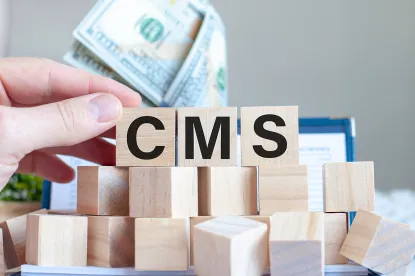Important developments related to required price reporting to Medicare for clinical laboratories under the Protecting Access to Medicare Act of 2014 (PAMA) have recently occurred. As a result, the clinical laboratory industry is hopeful that Medicare cuts scheduled to resume in 2023 and other aspects of PAMA’s price reporting requirements will be reformed.
In 2016, the Centers for Medicare & Medicaid Services (CMS) issued long-awaited final rules implementing PAMA (the 2016 Rule) and later made changes to these rules in 2018 (the 2018 Rule). PAMA was originally intended to transition the Medicare Clinical Laboratory Fee Schedule (CLFS) toward a fee schedule based on the prices paid to diverse segments of the clinical laboratory industry by private payors. PAMA required a broad range of clinical laboratories to submit private payor reimbursement data to CMS for purposes of Medicare CLFS rate setting. PAMA’s ultimate goal is to reduce Medicare’s spending on laboratory testing by implementing a market-based fee schedule.
American Clinical Laboratory Association v. Xavier Becerra
Some industry stakeholders, such as the American Clinical Laboratory Association (ACLA), have argued that PAMA’s reporting requirements have led to unintended consequences. ACLA recently received a favorable opinion in its lawsuit against HHS that challenged the scope of PAMA’s reporting obligations. ACLA originally sued HHS in December 2017 based on the 2016 Rule, which, among other things, implemented CMS’s definition of “applicable laboratory” with respect to the payment data reporting requirements. The 2016 Rule defined “applicable laboratory” as a laboratory that, bills Medicare Part B under its own National Provider Identifier (NPI) and that meets certain other requirements. This narrow definition led to skewed results in the first round of reporting due to the fact that certain laboratories accounting for a large amount of laboratory testing fell outside its scope.
According to the D.C. Circuit’s opinion, this methodology proved to be controversial because “. . . hospital laboratories that provide outreach services do not typically have their own NPIs, [and thus] the 2016 Rule exempts these entities from data reporting requirements, even if they meet PAMA’s statutory definition of an ‘applicable laboratory.’” ACLA argued that the regulatory definition of the term had an uneven and overall negative impact on Medicare reimbursement rates because of the large volume of laboratories likely being excluded.
Following dismissals and appeals at the D.C. District Court and D.C. Circuit levels, the district court focused on the 2018 Rule which amended the definition of “applicable laboratory.” Under the 2018 Rule, HHS stated that more laboratories furnishing tests to a significant level of Medicare Part C enrollees would be considered “applicable laboratories,” and it expanded the definition to include entities that bill Medicare Part B on the Form CMS-1450 14x bill type, which is used only for outreach (i.e., non-hospital patient) services.
The district court therefore found that more hospital laboratories would need to comply with PAMA’s reporting requirements and that the ACLA suit against the 2016 Rule was “moot.” However, ACLA appealed to the D.C. Circuit, maintaining that the 2018 Rule did not resolve all issues raised. The D.C. Circuit agreed with ACLA, stating that the 2016 Rule “results in inaccurate marketplace data and depresses Medicare reimbursement rates.” From an Administrative Procedures Act (APA) standpoint, the D.C. Circuit also ruled that HHS failed to meet APA standards and that the “2016 Rule is arbitrary and capricious because it failed to reasonably explain the agency’s use of NPIs to identify laboratory revenue.”
The D.C. Circuit remanded the case to the district court with the instruction to enter a declaratory judgment in favor of ACLA. The court was careful to note that, in addition to its denial to vacate the 2016 Rule, relief will be only prospective, and HHS will not be required to accelerate laboratory data reporting periods or recalculate past Medicare reimbursement rates.
Saving Access for Laboratory Services Act
While the D.C. Circuit’s decision is a victory for ACLA, the laboratory industry may be more focused on legislative action with the introduction in the House and Senate of the Saving Access for Laboratory Services Act (SALSA).
SALSA was introduced by in the Senate by Richard Burr (R-NC), Ranking Member of the Senate Committee on Health, Education, Labor and Pensions (HELP), and Sherrod Brown (D-OH). Sens. Burr and Brown noted that the next CLFS reporting period for clinical diagnostic laboratory tests is currently delayed until 2023 and that overall PAMA reporting has been delayed three times to date by Congress. These delays included the Laboratory Access for Beneficiaries (LAB) Act (2019), the Coronavirus Aid, Relief, and Economic Security (CARES) Act (2020), and finally the Protecting Medicare and American Farmers from Sequester Cuts Act (2021), which delayed the reporting period and the application of the 15% phase-in payment reductions resulting from private payor rate implementation to 2023.
SALSA would amend Section 216(a) of PAMA and introduce these key changes:
-
HHS would be required to publish a list of widely available clinical diagnostic laboratory tests and notify laboratories required to report information covered under SALSA of such lists.
-
For “widely available” tests (defined as tests performed by more than 100 NPI entities with Medicare reimbursement rates under $1,000), CMS would need to collect “statistically representative” samplings of payor data, including private payor data from all hospital outreach laboratories, independent laboratories, and physician office laboratories.
-
Effective, January 1, 2023, there would be lower limits on annual year-to-year CLFS payment rate reductions and increases, and no cuts would occur in 2023.
-
The definition of “applicable information” would no longer include Medicaid managed care rates.
-
Laboratories could choose to exclude manual (physically mailed) remittances from reporting, if such remittances represent fewer than 10 percent of the laboratory’s claims.
-
Laboratory reporting periods would be every four years instead of the current three years.
-
HHS would be required to publish enabling regulations by December 31, 2023.





 />i
/>i
